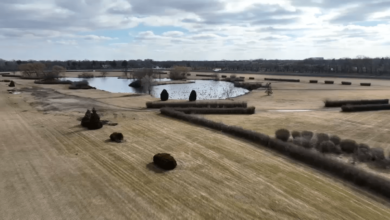China Urges Consumer Spending Amid Property Crisis

Welcome to Foreign Policy’s China Brief.
The highlights this week: China hopes to boost consumer spending as its property bubble slowly deflates, former Foreign Minister Qin Gang resigns from China’s legislature months after disappearing from public view, and a fire sparked in an e-bike parking lot kills 15 people in Nanjing.
A Chinese insurance giant’s banking arm is lending $1.1 billion to its real-estate investment arm as a credit line to repay its debts. The announcement from Ping An Insurance is a reminder that China’s property crisis affects more than just big-name developers as the bubble slowly deflates.
Although firms such as China Evergrande Group and Country Garden have grabbed headlines, defaulting on debt has become increasingly common for real estate companies—and it threatens even those not primarily focused on property, such as Ping An. Substantial property holdings are the norm for Chinese corporations as well as local governments. (Real estate makes up between 25 and 30 percent of China’s GDP.) Unraveling the mess will create a few dilemmas for the Chinese government.
Ping An, which has around 4.5 percent of its investments in property, is relatively shielded—as well as politically connected. But for other Chinese businesses, the 2021 collapse of the HNA Group now looks like a forerunner. The conglomerate began with regional carrier Hainan Airlines in 1993, becoming HNA Group in 2000. By 2018, as it fought off bankruptcy, the company’s real estate holdings in the United States alone totaled $4 billion, and property made up most of its $50 billion spending spree in the 2010s.
From the early 2000s onward, local governments embraced similar strategies, with property deals making up the majority of investment plans. As the property sector remained in the mire, these governments missed economic growth targets. Local governments also depend on land sales to property developers for fiscal spending. Those sales dropped from $1.21 trillion in 2021 to $810 billion in 2023.
Beijing now wants local governments to get away from the real estate market. Largely to deal with the local government debt crisis, China’s State Council issued injunctions to a dozen provinces and municipalities at the end of last year that put tight scrutiny on investments in big infrastructure projects, most of which are real estate vehicles.
At the same time, the central government aims to prop up the real estate market to avoid a collapse in public confidence. President Xi Jinping hopes to return to an era of strong state control of the real estate sector. But that isn’t likely to fill people with confidence either: Many in the upper middle class got rich when state property control came to an end, with crucial real estate handed over to households in the 1990s that soared in value in the 2000s.
The overall aim is to push the Chinese economy away from an investment-heavy model and toward one that includes significantly boosted household consumption. But there is no sign that ordinary households want to spend more, especially since their financial hopes are tied up in real estate: An astonishing 70 percent of Chinese household wealth is invested in real estate, more than double the U.S. figure. Until the property market recovers, people aren’t opening their wallets.
There is also a mismatch between this push for consumption and some of Xi’s other messaging. As Jeremy Friedman wrote in Foreign Policy last year, Beijing’s recent campaigns have turned on ideas of austerity, toughness, and sacrifice—from getting people to clean their plates to banning so-called “sissy men” from appearing on TV. None of this seems compatible with getting people to spend more freely, especially in a country where young people’s discretionary spending is shaped by a $19 billion influencer market dominated by women and men who embrace a feminine image.
It has been three decades since Japan’s real estate bubble popped, and the government in Tokyo is still grappling with some of the fallout. It’s possible—but not inevitable—to imagine a China that is still dealing with these issues in 2050.
Qin Gang resigns from legislature. Former Chinese Foreign Minister Qin Gang, whose disappearance from the public eye and replacement as foreign minister last year sparked rumors, has officially resigned from the National People’s Congress (NPC), China’s rubber-stamp parliament. The NPC meets for only a few days each year; being a delegate is effectively an honorary title. But it is significant that Qin was allowed to resign rather than being removed from the NPC, as with other fallen officials.
The resignation suggests that Qin’s fall from grace is relatively cushioned, adding weight to the theory that he was removed because of the personal blunder of an extramarital affair—and discrediting rumors of espionage charges or even summary execution. (Qin’s wife is also reportedly friends with First Lady Peng Liyuan, suggesting a back channel to Xi.) Meanwhile, former Defense Minister Li Shangfu has been removed from another post, playing out another slow and mysterious fall.
Media bright spot darkens. For years, Shanghai-based state media outlet Sixth Tone led analysts to ask, “How are they getting away with this?” The outlet spun out of a Chinese-language newspaper called the Paper. It offered remarkably good and honest reporting on tough topics, despite being founded in 2016, well into the Xi-era crackdown on Chinese media. It pulled it off thanks to both liberal leadership and publishing in English—therefore drawing less attention.
But Sixth Tone’s quality has gone downhill in the past year, with stories censored and many staff departing. The Wire China has an account of how the site rose and fell. A 2022 Year in Review column caught the attention of online nationalists, who began a campaign against the outlet that prompted an investigation. Sixth Tone’s decline is a reminder that even when Chinese journalists fight to carve out a space for good reporting, it is usually short-lived.
Deadly e-bike fire in Nanjing. A fire that started in an e-bike parking lot in a residential building in Nanjing killed 15 people, prompting authorities to promise new safety regulations. E-bike batteries caused a startling 21,000 fires in China last year alone. It is not a risk limited to China, but the number of e-bikes and the density of parking in the country makes the fires more common and more dangerous.
There are around 300 million e-bikes in China. Bicycles were once the standard personal vehicle; as cars grew more affordable, bicycles became seen as old-fashioned. However, as car traffic increased to new extremes in the 2010s, bikes made a comeback. Between 2014 and 2017, bike-sharing apps proliferated and then collapsed, littering the country with bike graveyards.
That created the space for e-bikes, but the new charging stations were hastily erected and, until now, largely unregulated.
Florida laws target Chinese scientists. In the United States, there has been a wave of state-level restrictions on Chinese technology and investment since 2020; Florida Gov. Ron DeSantis has been one of the movement’s leaders. Like Texas, Florida attempted to ban Chinese investment in real estate last year, but a federal judge blocked the law. But the state has kept a ban on public universities employing scientists from so-called countries of concern, such as China and Iran.
The law is hampering major projects, Bloomberg reports. Similar laws have grounded much of the state’s drone fleet, previously used for monitoring natural disasters.
This week, we share a short poem from one of China’s most renowned poets, Li Bai (701-762). It builds off of a fable, “Peach Blossom Spring,” in which poet and former bureaucrat Tao Yuanming (365-427) describes an undiscovered and paradisical realm tucked behind a riverbend, where the inhabitants live charmed lives free of the country’s warfare and politics.
Li Bai, whose life ended amid the chaos of the An Lushan rebellion (755-763) that claimed tens of millions of lives, dreamed of something similar, just down the river.
A Question in the Mountains, and an Answer
Translated by Brendan O’Kane
Ask me why I roost in these emerald mountains—
I’ll smile and not reply; my heart’s at ease.
Peach blossoms drift off on the waves away—
There are other earths and skies than these.
Source link





